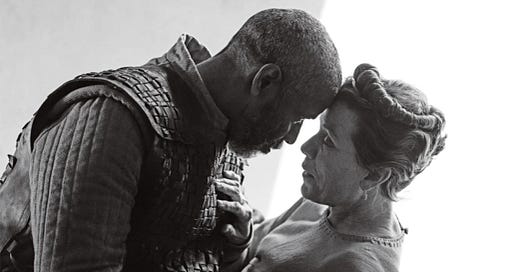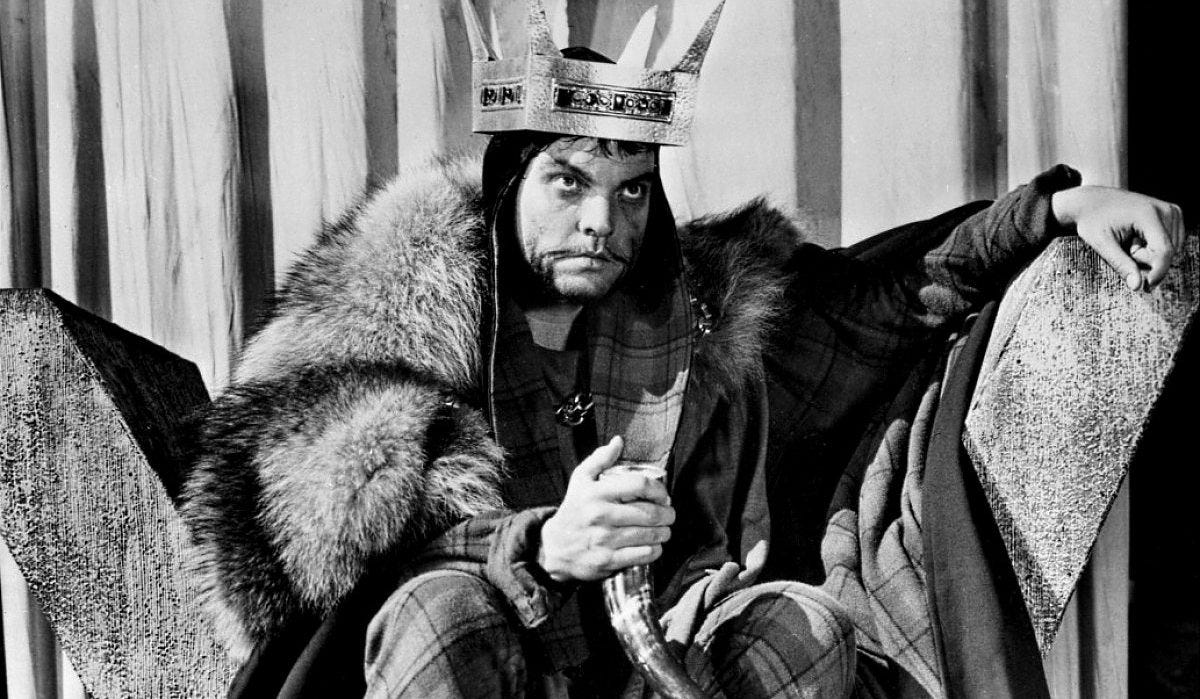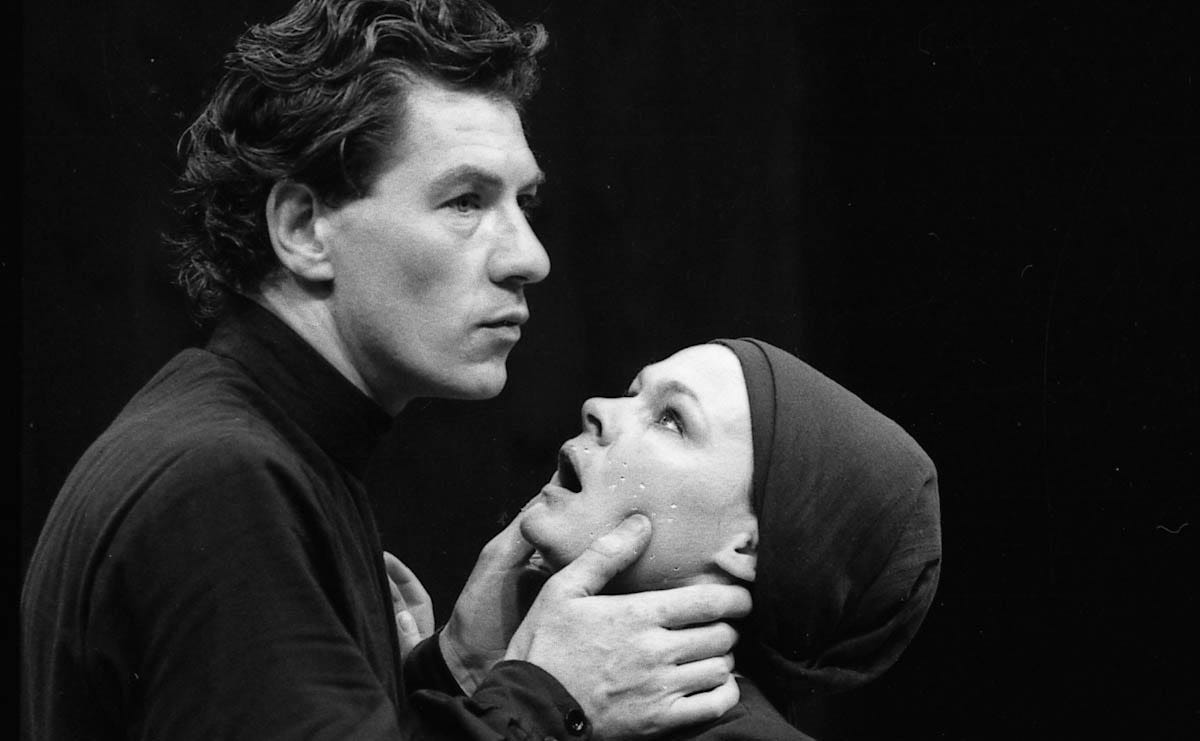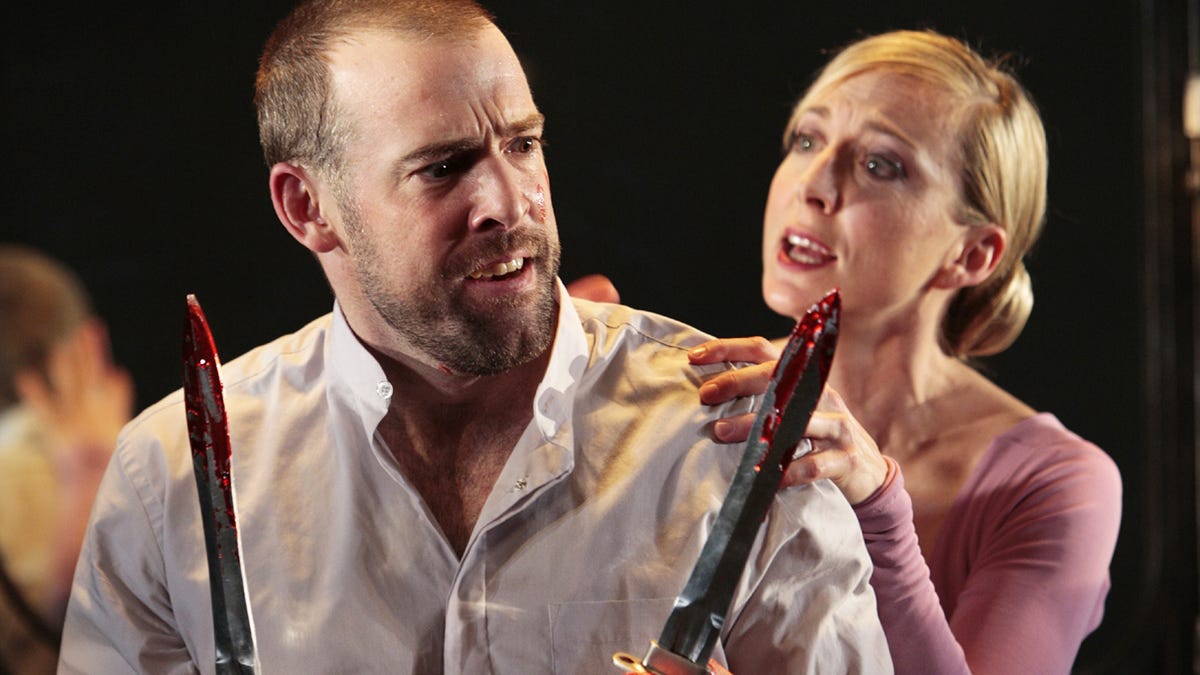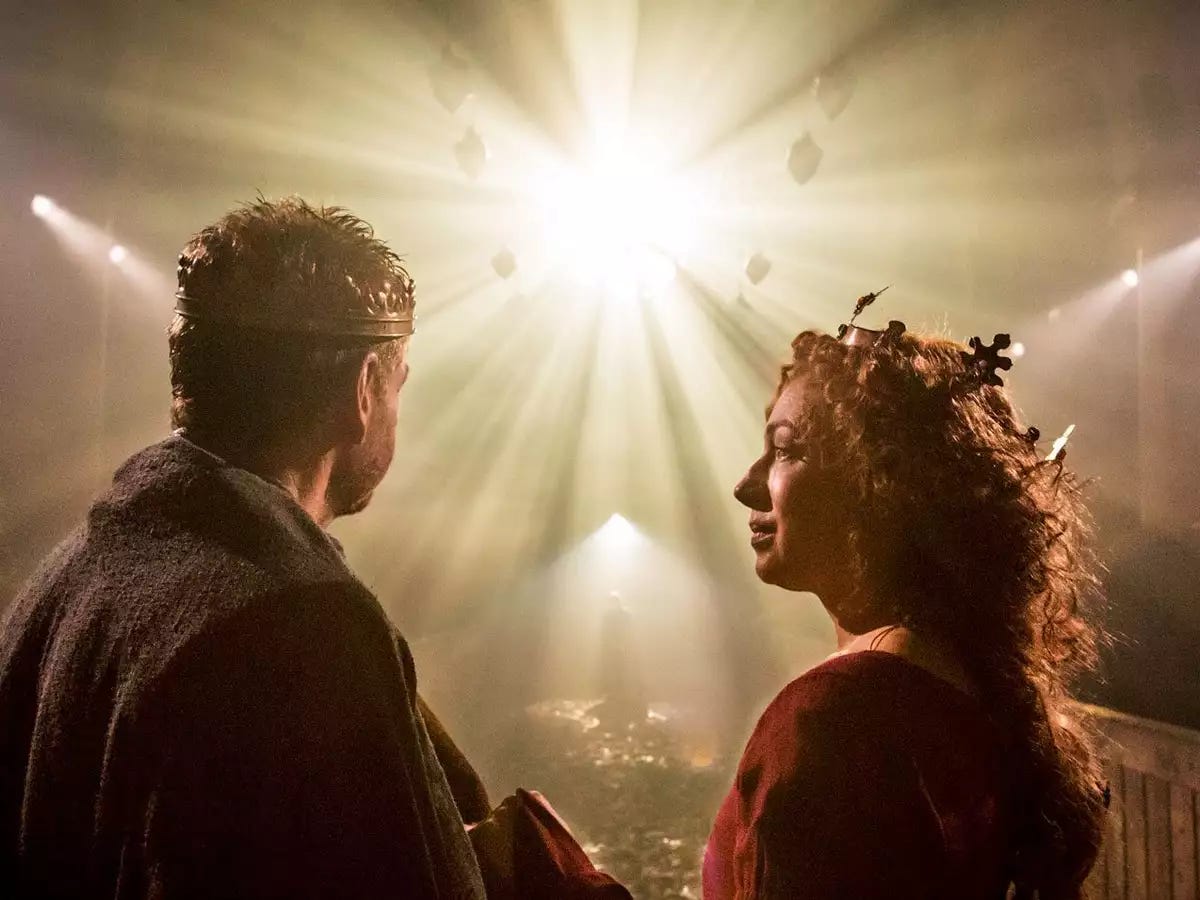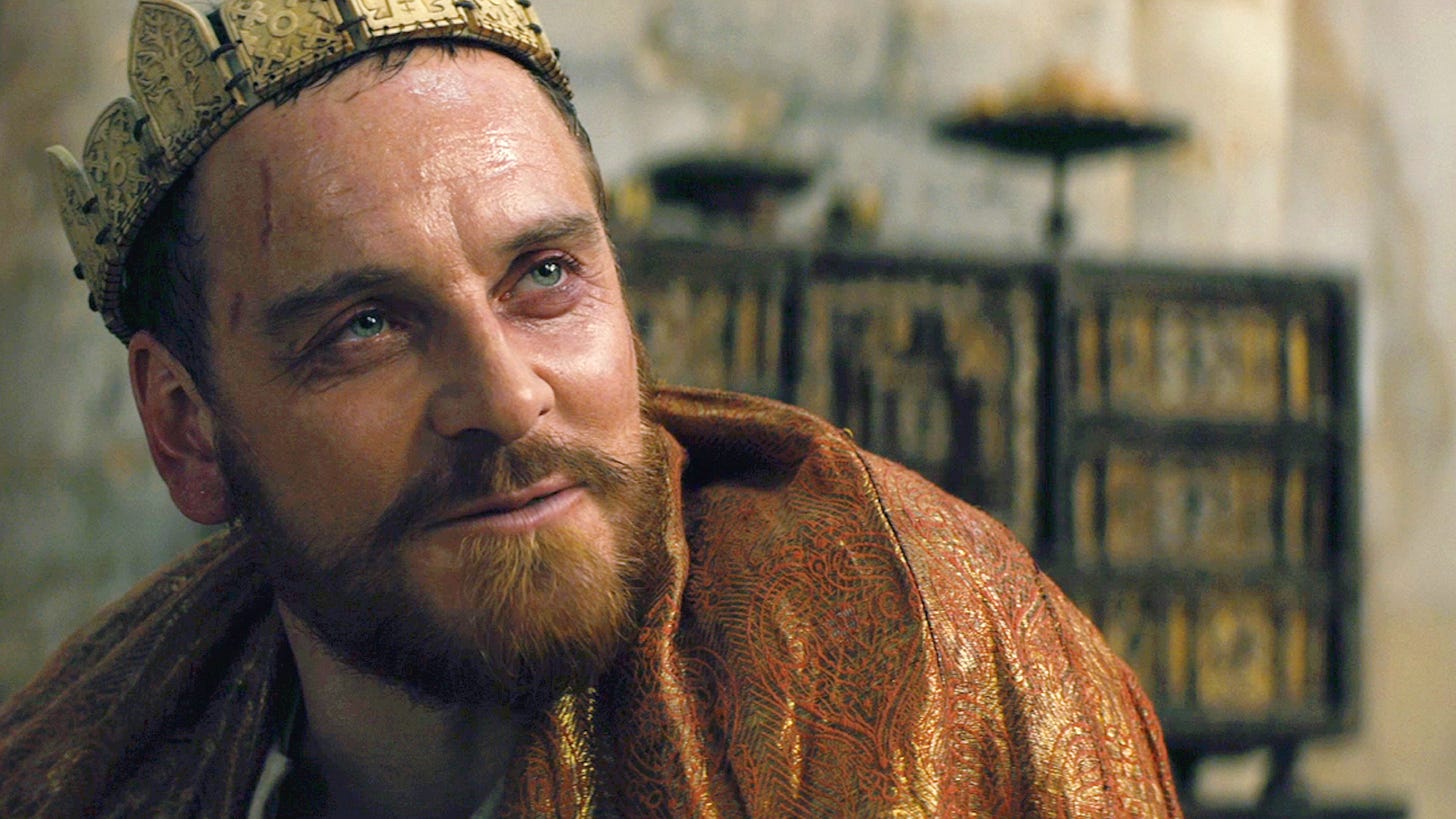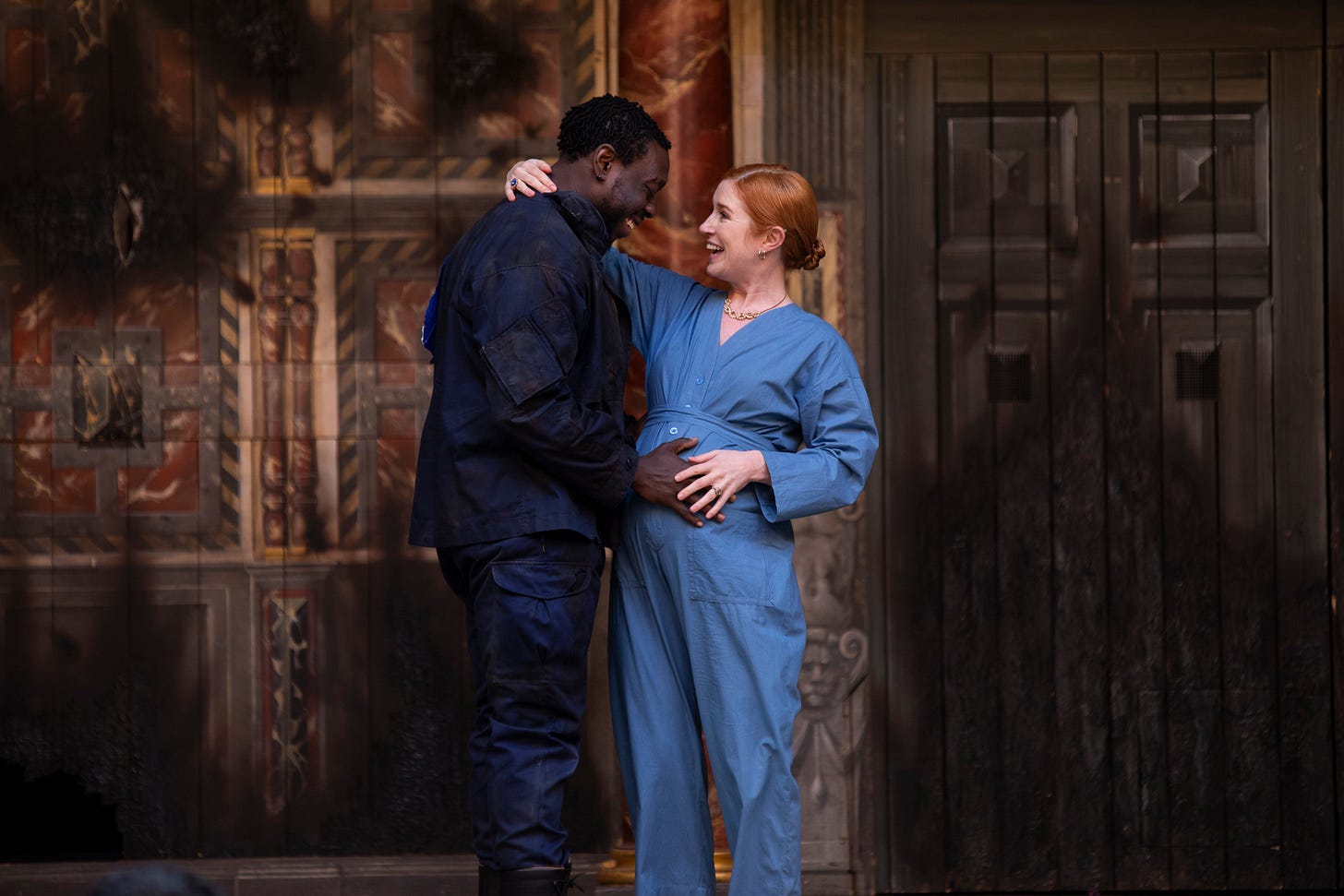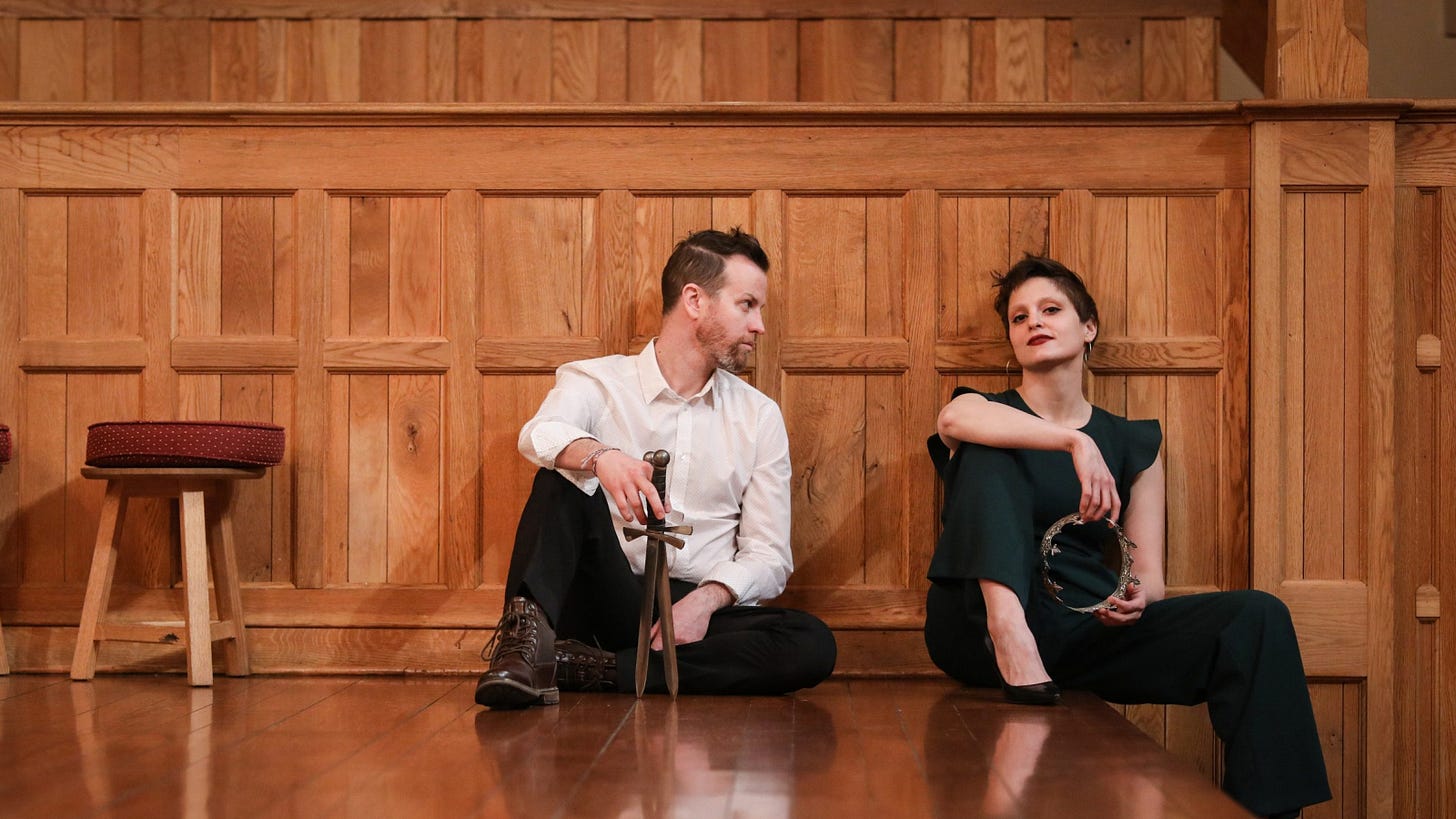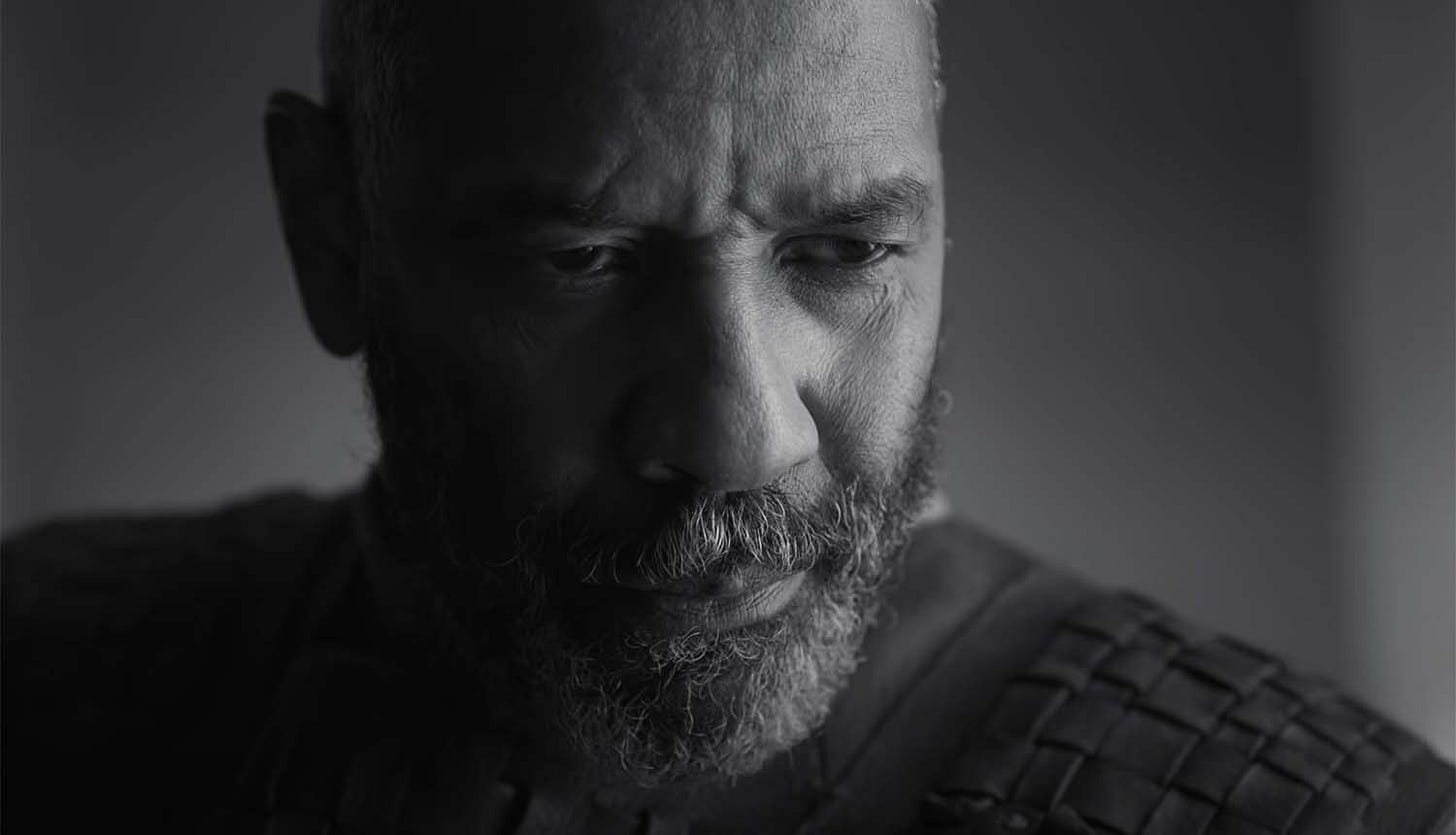This post is best viewed on our website.
I am a Shakespeare fan at my very core, an unapologetic lifetime season ticket holder. I teach A Midsummer Night's Dream to my middle schoolers, I'll sing the praises of Henry VI Part II to anyone who will listen, and it's a goal of mine to see every one of his plays performed live - I'm at 24 of the 37, some of them are hard to find!
But I've never liked Macbeth. It's never been my tragedy of choice, nor my fifth or ninth pick. I've never quite understood the appeal. In preparation for reviewing the now-playing production with Ralph Fiennes and Indira Varma in Washington D.C., I decided to reread the text, dig deeper into my misgivings, and explore multiple versions, both stage and film, to see if I could better appreciate the Scottish Play.
Below you'll find eight reviews of theatrically released films and professionally-shot theatrical productions (all of which I found completely legally online), to go along with the two or three that I couldn't finish. I still don't know if I'll ever love Macbeth (spoilers for this piece, I suppose), but I think you'll see my respect and admiration blossom.
Macbeth (1948)
Orson Welles was a life-long lover of Shakespeare and was, for many years, considered a respected interpreter of those works. He is probably best known in the film space for playing Falstaff in his concocted Chimes at Midnight, a patched-together version of the Prince Hal plays, but he did many of them on stage as well, including the famous "Voodoo Macbeth" a decade before this film.
In this version, Welles takes inspiration from the increasingly popular film noir and it feels like he’s claiming that Macbeth is the original noir. His version is moody, gloomy, and has the always necessary femme fatale in Lady Macbeth.
Unfortunately, he was hampered by a tight budget (issues with money were an ongoing theme in his career), trying to make the most of his depleting funds - even going as far as to film on leftover western sets. As a result, I just don't think it comes together. I can see what Welles is going for, but he's just not able to pull it off. My worst nightmare of Macbeth (and one I've sat through before) is a mumbly, dark-and-stormy night drowse. This just feels that way to me. I can see what's in his head, but I don't see it in the film. It's a shame.
Royal Shakespeare Company, 1979 (dir. Trevor Nunn)
If I'm going to be convinced of Macbeth's greatness, there's no better place to look than arguably the play's two most iconic performances, Ian McKellen and Judi Dench.
It seems as though McKellen has many of the same issues I have with Macbeth. "The play is considered unlucky," he says in Acting Shakespeare, "perhaps because it so rarely works. It's nevertheless popular with audiences, perhaps because it's Shakespeare's shortest." We both agree that the witches are almost unnecessary and that the tension is often fragile, but he believes that director Trevor Nunn solves many of those issues with this 1976 staging. I can agree with McKellen on almost all of those points, but I disagree with his credited solution. This version is worthwhile, of course, because of McKellen and Dench.
He's one of the few Macbeths who seems to have some of the self-sufficiency he demonstrates on the battlefield. It makes his lunacy-fueled downfall that much more tragic. There's a moment where he's crying, snotting, and literally spitting out his lines, all at the same time. That's a guy who's in it. In Acting Shakespeare, McKellen goes on to say that Lady Macbeth was "Judi Dench's finest performance" and that very well may be true. She's both the angel and devil on his shoulder, truly evil but always charming.
They're directed by Nunn, then-director of the Royal Shakespeare Company and, if you listen to anybody around at the time, the most genius and inventive theatre artist to ever live. He stages this version not in the RSC's largest stage, but in their smallest space (revolutionary!) In-the-round, bare-bones, and with just a few wooden crates, this dressed-in-all-black acting company of 12 is delivering a show that's about the text and the performances. This kind of stuff is all over the place now but was game-changing back then. This is just a few years after Peter Brooks' staging of A Midsummer Night's Dream.
Filmed a few years after opening night, it's presented the same way we would see Nunn's pro-shot of Cats years later: filmed on the stage but without an audience. The soliloquies feel direct to you and personal, but I would still like to see how an audience responded to all this. As it is, the only thing I'm taking away are the lead performances.
Folger Theatre, 2008 (dirs. Aaron Posner & Teller)
This production, performed at DC's Folger Shakespeare Library, was co-directed by local fan-favorite Aaron Posner and Teller - yes, of Penn & Teller fame. You would imagine that, as a result, the play's magic would be turned up to 11. That's certainly how they pitched this production anyway. I suppose that's true, the dagger he sees before him floats and the witches do some trickery, sure. But that's it. After that, it's just another production of Macbeth.
It's filled with plenty of familiar faces for those who see DC theatre, which is my regional theatre city of proximity. Ian Merrill Peakes is a Macbeth type and has played the part in several different productions, even reuniting with co-star Kate Eastwood Norris in Folger's 2018 production of William Davenant's adaptation of the play. Familiar faces you still see around town include Paul Morella and Cody Nickell, but the highlight for me, as he often is, is Eric Hissom, who plays the Porter and one of the Weird Sisters. The Porter can be a real energy-sucker amid the Macbeths' plotting, but Hissom, as usual, is so funny and so sincere that he's a welcome addition and not a needless distraction.
It used to be that the only way to see this pro-shot was to buy the Folger edition of the text with the DVD sleeve in the back. Remember crap like that? Well, now you can just watch it on YouTube.
Manchester International Festival, 2013 (dirs. Rob Ashford and Kenneth Branagh)
This version, co-directed by Rob Ashford and leading man Kenneth Branagh, played a deconsecrated church in England and the Park Avenue Armory in Manhattan. They performed in these non-traditional spaces so they could create a trench-like dirt-floored playing area with rows of benches on either side. It is reminiscent of the setup at the Medieval Times near your mall. However, it doesn't have any of the stuff at Medieval Times that gets you your $67.95 plus tax worth, like actual horses used in a joust, the succulently tender turkey legs, and, of course, the paper crowns. It just has rain (which makes the playing space really muddy and gross) and real candles. And they charged as much as $350 for a ticket!
It also seems as though Branagh wanted to play this part because...well...it's one of the Shakespeare characters. He already did Hamlet, Benedick, and Henry, went on to do Leontes next, and, as of this writing, is in between runs as Lear. It's one of the characters that you should play if you are a serious Shakespearean. Never mind the fact that he doesn't really make sense for the part.
Well, that's not entirely true. He jumps head-first into the insanity of the character, screaming and slobbering - his rendition of the line "a tale told by an idiot, full of sound and fury, signifying nothing," is just that. He is just simply not believable, however, as a great warrior. His fifty-year-old knees don't help his imbalance on the uneven stage. The battles are slow. They could've at least had some horses to liven it up.
Macbeth (2015)
Ophelia, Mercutio, Cordelia, Lady Macbeth - they all die offstage. This is, of course, a result of the limitations of staging plays during Shakespeare's time. It's more practical and more economical, but has posed a challenge for directors in the age of full-stage blackouts. Why does all the best stuff happen away from us?
Justin Kurzel's 2015 film adaptation of Macbeth almost seems built around staging, and therefore filming, all of the stuff that usually happens only in explanation. If Macbeth is such a fierce warrior, we should see him kicking some ass. If the murder of Duncan is the play's most crucial turning point, maybe we should see it happen. If the Macbeths have lost a child and it informs their perspective on mortality, then the film opens with the funeral of that child. Filmed against a brooding Scottish landscape, it's a beautifully shot examination of the play and its most never-before-scene moments.
The performances can get a little mumbly, however, with both Michael Fassbender and Marion Cotillard finding a whisper to be a much stronger choice than I do. It's probably more accurate for their descent into madness, but that doesn't make it more interesting. Because of that, I probably wouldn't find much interest in this Macbeth if I watched it separately from this project. Kurzel's decisions and vision make it stand out above the rest, I just wish we got a little more from the acting company.
Shakespeare’s Globe, 2020 (dir. Cressida Brown)
I don't believe that there is a better place to perform Shakespeare than The Globe. And I don't believe there is a more deserving audience than schoolchildren. And I don't believe there are better conditions to see Macbeth than drizzling rain.
For all that, this 2020 production (performed right before the pandemic and released during the lockdown for at-home viewing) performed for students has an advantage over other productions. And it's only 90 minutes! You're telling me I can get Macbeth with way less Macbeth? It's a match made!
Much of the play is designed with their intended audience in mind. There are a few choices that may feel a little obvious for adult audiences (balloons that spell "CONGRATS" after Macbeth's victory soon lose the C, the O, the N, and the G...), but it's their most mature decision that is the most interesting: Lady Macbeth is pregnant. We know from the text that the Macbeths once had a child ("I have given suck and know how tender ’tis to love the babe that milks me") and we know from the absence of a child that they no longer have that baby.
But if she's pregnant now? Again? It gives a whole new meaning to the line, "I would, while it was smiling in my face, have pluck’d my nipple from his boneless gums and dash’d the brains out, had I so sworn as you have done to (kill the king)." It brings up themes of second chances and redemption. It makes her more calculated while simultaneously less suspicious. And it even further makes her the most interesting character in the play.
American Shakespeare Center, 2021 (actor directed)
For many years, I would have considered the American Shakespeare Center (in Staunton, Virginia) one of the country's best regional theatres. Staging classic texts in the Blackfriars Playhouse, a recreation of Shakespeare's indoor theatre, they perform classic and modern plays under the guise of what they call "Shakespeare's Staging Conditions," which is to say that they use Will's guidance in staging, casting, costuming, and music. Recent productions of King Lear (2016), The Merchant of Venice (2017), and Bloody Bloody Andrew Jackson (2016) were, in my opinion, definitive.
COVID lockdown was hard for businesses of all kinds, but live theatre seemed to be one of the hardest hit. Unfortunately for the ASC, inner turmoil had been brewing and the pandemic only exasperated those issues. Left without an artistic director and still recovering from the pandemic, the organization turned to longtime company members John Harrell, Chris Johnston, Zoe Speas, and Brandon Carter to run the 2021 season in the long tradition of actor-managers in Shakespeare productions.
That season, which saw Johnston and Speas playing Macbeth and Lady Macbeth, was again cut short by what the Washington Post called, "internal strife over how the company is run, and its treatment of women and people of color." Little else is known to the public, but in seasons since many beloved actors left (and never returned) and the infrastructure of the presented plays has changed significantly.
This production, preserved through online rental which I totally didn't rip from the internet, is a perfectly fine version of Macbeth in their usual style of actor-directed shows, where the acting company makes all of the staging, costuming, and musical decisions. It represents more strongly, however, the final breath of a once-great theatre company that has been only serviceable since.
The Tragedy of Macbeth (2021)
I would like to approach this film by discussing the three most memorable performances:
Denzel Washington as Macbeth: I'm not entirely sure that I agree with Denzel's casting. We all know that he's an amazing actor and a qualified Shakespearean, but Macbeth? I don't know about you, but I find Denzel to be an overwhelmingly confident force. If Macbeth is to unravel throughout the play, I find it hard to believe that a guy who walks and talks like Denzel could go droolingly cuckoo. His version of paranoia seems better fit for something like Leontes in The Winter's Tale.
Frances McDormand as Lady Macbeth: I just can't get over the fact that director Joel Coen asked his wife to play Lady Macbeth. While the internet is obsessed with dividing the Coen Brothers output between Joel and Ethan after they've both released independent films, I'm much more interested in the Joel and Frances collaboration. Anyway, she's always turning in good work.
Kathryn Hunter as The Witches: If you missed Kathryn in this film and don't remember her one-film appearance in Harry Potter (Order of the Phoenix, to be exact), you were probably introduced to her in Poor Things, in which she was excellent. I slightly beat other Americans to the punch when I saw her heavy-hearted Timon of Athens in D.C. a few years ago, but I'm jealous of British audiences who have gotten her, and her Shakespeare, for years and years. She's just so...weird!
Want to commission a review? Order from this list and you’ll get one in 30 days!

